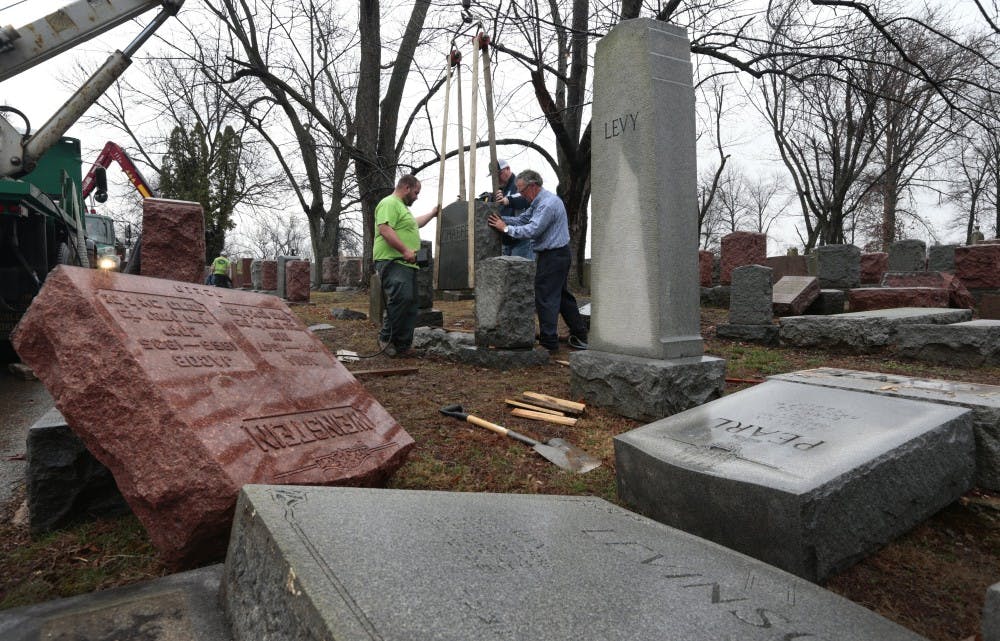Though a heightened atmosphere of anti-Semitism has not physically manifested itself at Elon University, Jewish students and faculty on campus view the increased discrimination against the Jewish community nationwide as a cause for concern.
In recent months, Americans have witnessed a surge in anti-Semitism with the desecration of Jewish cemeteries and bomb threats against Jewish communities. At least 69 threats have been called in to Jewish Community Centers in 27 states as well as a Canadian province since Jan. 1, according to the National Review.
As Jewish students and faculty at Elon come to terms with the causes of this sudden rise in anti-Semitism, they are also thinking about actions that could be taken to ease what has become a pervasive problem.
“It scares me,”said freshman Julia Goldstein. “I take it seriously. This is an actual issue and something needs to be done about it.”
Freshman Daniela Nasser has become more aware of her own sense of self when walking around campus because of the rise in anti-Semetic threats.
“I think with the recent threats, it’s definitely just made me a lot more cautious about how I act in public because I have been a little nervous about things like that,” she said.
Rabbi Meir Goldstein, associate chaplain for Jewish Life, said the recent rise in anti-Semitism comes during a time when other forms of prejudice, such as anti-Muslim attacks and acts of racism, are on the rise as well.
“It’s all coming in the space of time where folks who are filled with hate and are acting on the hate that they have for other people,”Meir Goldstein said. “It’s the greater context of what’s going on right now.”
According to Meir Goldstein, the rise of hate crimes in the United States is connected to the recent change in government administration.
“I would say that it seems clear that the 2016 presidential election and the rollout of the new presidential administration played on fears and xenophobia that folks had prior to the campaign,” Meir Goldstein said. “However, it seems that the way the campaign was run has emboldened folks to feel that it’s permissible to act on behavior, bigotry and prejudice that in the past may have felt inappropriate.”
Nasser agrees that the recent acts of prejudice can be linked to the current political climate.
“I’m not saying necessarily that Trump has sparked this because he wants this to happen, but I think it’s more the idea that with his radical sense of demeanor, people have taken that and interpreted and applied it to their own radical beliefs,” Nasser said.
Despite President Donald Trump’s Feb. 21 public statement against anti-Semitism, Meir Goldstein would like to see Trump do much more to prevent the further spread of hate moving forward.
“I would like to see more rhetoric and I would like to see President Trump take a more vocal and prophetic position against prejudice and bias and violence and even more so I’d like to see policy that would push the community in that direction,” Meir Goldstein said.
Julia Goldstein agreed and said the government needs to take action.
“I think that Congress needs to step up and something needs to be done because throughout history, there have been waves of anti-Semitic acts in every single country,” she said.
Outside of government policy and legislation, students and faculty advocated for other methods to prevent the further spread of inclusive causes.
“I think things just like the Women’s March need to be taking place right now,” Nasser said. “On an individual level, it’s important to stay alert and educated so you can have conversations with other people.”
According to Meir Goldstein, the most critical task is building relationships between Jewish and non Jewish people along with forging coalitions between religious communities. Goldstein referenced the relationship between the Jewish community and the Muslim community in Greensboro as an example. Since 2015, the two groups have met to discuss topics related to inclusion.
During a time when acts of hatred and prejudice are widespread, Goldstein emphasized the importance of people working together across religious boundaries.
“As we get to know each other, then it’s harder to have preconceived notions and prejudices because we’re no longer some strange ‘other’ that we can dehumanize,” he said.


